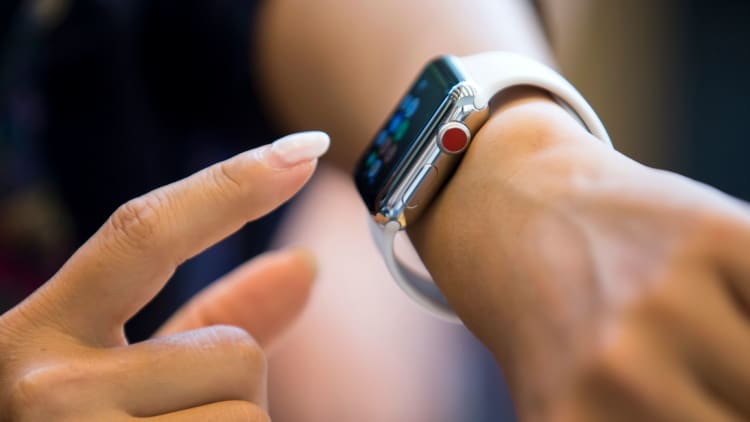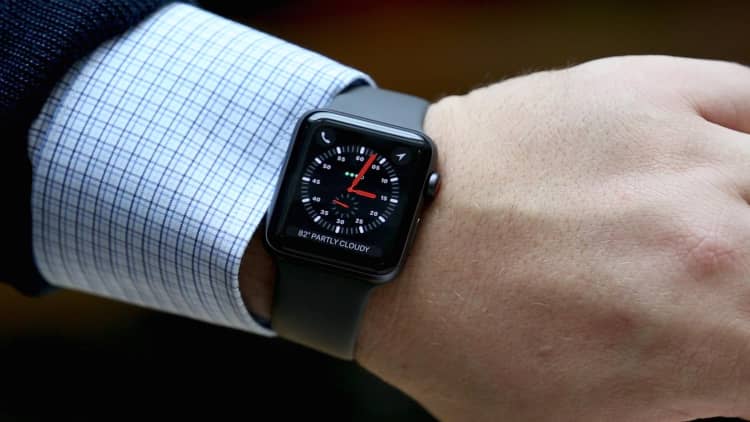
Apple has released a first-of-its-kind Heart Study app to research whether its Apple Watch can pick up a heart rhythmic disorder called atrial fibrillation — one of the most common causes of strokes and heart failure.
People who sign up for the study will use the watch to monitor their heart rate and heart rhythm and will consult with a physician if there's an abnormality.
"This might seem like a simple study, but we think this is a really special time," said Apple Chief Operating Officer Jeff Williams in an interview. "Hopefully we can save a lot of lives."
Atrial fibrillation is responsible for some 130,000 deaths every year in the U.S. alone.
Not a diagnostic tool
Apple's goal is to screen for, rather than diagnose, heart rhythm abnormalities in a general population.
That's an important distinction, as Apple made clear that the watch is not on the path to becoming a regulated medical device. But as the watch moves beyond wellness and fitness applications, the company has been working closely with federal regulators and plans to submit the results from the study for review, he said.
Apple decided to invest in the study after hearing from a deluge of users that the Apple Watch saved their life, he said.
"It has been a very organic journey," said Williams. "We didn't wake up one day and say 'we did iPhone, then we did iPad and let's knock out health next.'"
Detecting atrial fibrillation is a big opportunity to help people avoid illness, since many people don't experience symptoms and the condition often goes undiagnosed.
Moreover, the study — which includes a young and healthy population rather than just at-risk populations — could potentially detect when heart rhythm abnormalities are likely to be problematic and when they're not.
Previously, these data were hard to come by because only those at high risk, such as seniors and people with a history of strokes, were monitored from home.
Anyone over age 22 can sign up to participate in the study, which is being administered by Stanford University's School of Medicine, as long as they have an Apple Watch Series 1 or later.
The company has previously supported researchers in developing their own iPhone-based research studies, but this is the first time Apple has released an app of its own. To date, its ResearchKit and CareKit software frameworks have been used by over 500 outside researchers to recruit 3 million participants.
How it works
Since it was released in 2015, Apple Watch has always included a heart rate sensor. But to screen for atrial fibrillation, Apple needed to do more: It needed to monitor the heart's rhythm.
To do that, the company used a combination of both hardware and software tools.
It works by combining LED lights that flash hundreds of times each second and light-sensitive semiconductor devices to detect the quantity of blood flowing through the wrist. These sensors gather these signals from four points on the wrist. The software algorithms then look for patterns to isolate irregular heart rhythms.
If the Apple Watch picks up on a problem, those who participate in the study will get a notification and an offer of a free consultation, via a phone call or video, with a remote doctor. These virtual visits are provided by American Well, a privately held company.
The doctor will run through some standard questions and suggest a visit to the emergency room for further tests, or send the subject a patch called an electrocardiogram or EKG, which is considered the gold standard for diagnosing atrial fibrillation.
Longer-term, a company called Alivecor is developing an interchangeable Apple Watch band with an in-built EKG to detect atrial fibrillation and other conditions.
It remains to be seen whether Apple will work with insurance partners to provide a discounted or free device to those who can't afford an Apple Watch. It recently held meetings with Aetna to nail down a strategy to provide watches to millions of its members.
Because the study is based on a mobile device, anyone can sign up regardless of their proximity to a medical center. Williams described it as "a bit of a breakthrough in that it's a virtual clinical trial," which will be broadly available to a large population.
That's unique and will help dramatically increase the people who can participate in the study. But it also means the company will need to show that it isn't sending healthy people to the hospital armed with data from an Apple Watch. That's a big challenge, medical experts say, because testing or screening a healthy population always carries with it a risk of false positives.
"We may all have a little of it, if we start looking for it," said Dr. Harlan Krumholz, a cardiologist and director of Yale-New Haven Hospital Center for Outcomes Research and Evaluation. He added that the medical system is not yet equipped to handle such information.
A potential abnormality in an otherwise healthy young person could require further tests and procedures, for instance, or it could it resolve on its own. Doctors don't necessarily know.
But Dr. Lloyd Minor, Stanford's dean of medicine, said his team has been "very thoughtful in how we've set up this research study," and that he doesn't think it will lead to false positives.
Despite his concerns, Krumholz said studies like this represent a "new era of medicine," where clinical research is open to anyone, regardless of their medical diagnosis, physician or proximity to a physical site.
'The executive team has embraced this'
Williams said he has a personal passion for health care, which he views as an exciting opportunity to empower people to take a more active role in their health.
Working with outside partners from the health industry has helped Apple figure out a way to incorporate user privacy, so data isn't shared with third parties for marketing purposes, and proper consent.
"We have taken a thoughtful approach to this and embraced the medical community," Williams said.
Apple is also ensuring that users will own their personal health information, which isn't always the case in the medical industry, so they can share it with their own doctor.
He also said the higher-ups at Apple haven't spent a "ton of time" discussing how to monetize its health efforts and have focused instead on the consumer experience — although he did note that in the process the company might sell more watches.
"The executive team has embraced this," he said. "It's hard not to get excited."
The watch study is part of Apple's growing interest in health care. The company has added dozen of medical experts on its growing health team in recent years, including Stanford's Sumbul Desai. It has also explored ideas like bringing clinical data, such as detailed lab results and allergy lists, to its devices, and using the watch or perhaps a future device to monitor glucose levels in diabetes patients.
Related video: Would you exercise daily for a discounted Apple Watch?



